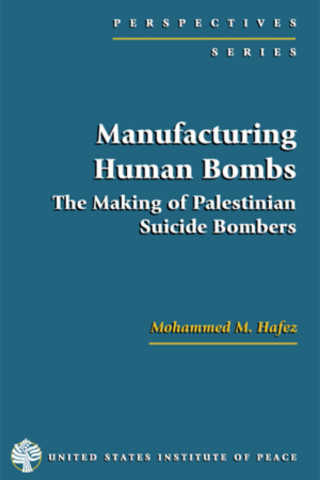Manufacturing Human Bombs
Suicide bombings have become a terrifyingly familiar feature of contemporary warfare and insurgency. But explanations of such attacks are typically either too narrow or too superficial to enable us to understand—and thus combat—this complex and deadly phenomenon.
In this slim but remarkably balanced, informative, and insightful volume, Mohammed Hafez delves beneath the surface as he explores the case of Palestinian suicide bombers during the al-Aqsa intifada that began in 2000. Drawing on extensive research in the West Bank and Israel, Hafez reveals an intricate web of factors that fueled the campaign of suicide attacks. To understand the bombings, he argues, we must examine the interrelation among the motives of the individual “martyrs,” the calculations of the organizations that deployed them, and the attitudes of a victimized society. This approach yields not only a penetrating look at suicide bombers but also policy-relevant lessons for dealing with extreme political violence in places such as Iraq, Chechnya, and Afghanistan.
Highly readable, wonderfully concise, and packed with useful information, Manufacturing Human Bombs offers students an excellent introduction to its subject; for readers already well versed in terrorism and the Middle East, the volume offers a rare combination of rich empirical data, considerable analytical breadth and depth, and refreshing evenhandedness.
Mohammed Hafez
Mohammed M. Hafez earned his Ph.D. from the London School of Economics and Political Science in 2000. From 2013–2018, he served as the Chair of the Department of National Security Affairs at the Naval Postgraduate School in Monterey, California. A specialist in Islamist movements and political violence, his books include Why Muslims Rebel: Repression and Resistance in the Islamic World (2003); Manufacturing Human Bombs: The Making of Palestinian Suicide Bombers (2006); and Suicide Bombers in Iraq: The Strategy and Ideology of Martyrdom (2007). His current book project, The Nearest Enemy: Factionalism and Fratricide in Militant Islamist Networks, investigates inter-rebel wars in Algeria (1992–2002), Iraq (2003–2011), and Syria (2011–2016) using a combination of comparative case analysis and network-analytic methodologies.
Dr. Hafez is also the author of over 25 journal articles and book chapters on political radicalization, foreign fighters, and Islamist ideologies. He regularly briefs government and military analysts on issues related to terrorism, the war of ideas, and countering radicalization. Dr. Hafez has made several appearances on PBS News Hour, NPR, CNN, C-SPAN, and other national and international media forums.

